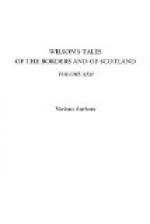So, too, doubtless had Mr. David Grierson, who, after indulging in his reverie, wherein the subject of will-making suggested a match between himself and a certain bridegroom who never says nay, awoke to the interest of his scheme of match-making in this world. So far he had accomplished his object, for he could rely upon his faithful Rachel’s performance of her promise; and if the two should be married, he knew how to take care to give her the power of the money, and keep a youth, in whose prudence he had no great faith, in proper check. Next he had to sound the nephew. Nor was it long before he had an opportunity—even that same afternoon.
“Walter,” he began with an abruptness for which probably the young man was scarcely prepared, “I am getting old, and must now think of arranging my affairs so as to endeavour to make my fortune serve the purpose of rendering those happy in whom I have a natural interest. So I have some interest also as well as, I suspect, some right to put the question to you, whether you ever thought of Rachel Grierson for your wife?”
“Upon my word,” replied the nephew, with just as little mauvais honte as suited his nature, “I never thought of aspiring to the honour.”
A word this last which grated on the ear of the rich merchant-burgess, inasmuch as it suggested a suspicion of the figure of speech called irony, seeing that Rachel Grierson was a bastard, and the youth carried the legitimate blood of the Griersons in his veins.
“Honour or no honour,” replied he sharply, and perhaps contrary to his original intention, “Rachel Grierson is to inherit my fortune, ay, every penny thereof.”
“Every penny thereof,” echoed the youth, as if his mind had flown away with the words, and dropt them in despair as it flew.
“Yes,” rejoined the angry uncle, “lands, tenements, hereditaments, shares, dividends, stock, furniture, bed and table linen.”
“And table linen,” echoed the entranced nephew.
“Yes; everything,” continued the uncle; and calming down as he saw the white lips and blank despair of the youth, he added—“And to you I will leave and bequeath my natural-born daughter, Rachel Grierson.”
And as he uttered these significant words, he watched carefully the face of the youth, where, however, all indications defied his perspicacity, inasmuch as blank astonishment was still the prevailing expression. But after some minutes the young man stuttered out—
“A legacy worthy of a nobleman!”
Words that sounded beautifully, because they were true as regarded Rachel, whatever they might be as respected his secret intention; yet as the children vaticinate from the examination of each other’s tongues, if the uncle had examined the organ, he might have discovered some of those blue lines which produce an exclamation from the young augurs.
“Words worthy, too, of a nobleman,” cried the old man in a trembling voice; and holding out his hand, which shook under his emotion of delight at hearing his beloved Rachel so praised, he seized that of his nephew—




